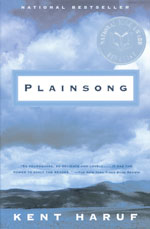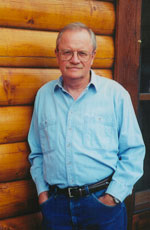About The Book

“Plainsong” is a heartstrong story of family and romance, tribulation and tenacity, set on the High Plains east of Denver. In the small town of Holt, Colorado, a high school teacher is confronted with raising his two boys alone after their mother retreats first to the bedroom, then altogether. A teenage girl—her father long since disappeared, her mother unwilling to have her in the house—is pregnant and alone with nowhere to go. And out in the country, two brothers, elderly bachelors, work the family homestead, the only world they’ve ever known.
From these unsettled lives emerges a vision of life, and of the town and landscape that bind them together— their fates somehow overcoming the powerful circumstances of place and station, their confusion, curiosity, dignity and humor intact and resonant. As the milieu widens to embrace fully four generations, Kent Haruf displays an emotional and aesthetic authority to rival the past masters of a classic American tradition.
Utterly true to the rhythms and patterns of life, “Plainsong” is a novel to care about, believe in, and learn. –Random House
“Plainsong” was a finalist for the National Book Award, the New Yorker Book Award, the Los Angeles Times Book Award, and the Book Sense Award. It won the Mountains & Plains Booksellers Association Award, the Salon.com Book Award, the Midlands Authors Award, the Alex Award from the American Library Association, and the Evil Companions Award from the Colorado Quarterly. It was selected as a Notable Book of the Year by both The New York Times and the Los Angeles Times, was a national bestseller, and has been translated into eight languages.
About the Author

Kent Haruf was born in Pueblo, CO in 1943. He received a B.A. degree from Nebraska Wesleyan University and an M.F.A. from the University of Iowa Writers’ Workshop. He served in the U.S. Peace Corps in Turkey and has taught high school English in Wisconsin and Colorado and fiction writing at Nebraska Wesleyan and Southern Illinois University at Carbondale.
His most recent novel, PLAINSONG, is set on the high plains of Colorado and has been widely celebrated. It was a finalist for the National Book Award, the New Yorker Book Award, the Los Angeles Times Book Award, and the Book Sense Award. It won the Mountains & Plains Booksellers Association Award, the Salon.com Book Award, the Midlands Authors Award, the Alex Award from the American Lbrary Association, and the Evil Companions Award from the Colorado Quarterly. It was selected as a Notable Book of the Year by both The New York Times and the Los Angeles Times, was a national bestseller, and has been translated into eight languages.
Haruf is the author of two earlier novels, The Tie That Binds, which received the Whiting Foundation Writers’ Award, and Were You Once Belonged, which received the Maria Thomas Award for Fiction. He is the recipient of an Illinois Arts Council Grant, and his short fiction has appeared in The Best American Short Stories.
He is the father of three daughters and he and his wife Cathy live in Colorado.
A Conversation With Kent Haruf
From Random House
Why did you entitle this book “Plainsong”?
As the dictionary definition of "plainsong" indicates, I mean this to be a story about centuries-old matters and told in a plain unadorned manner. And of course I’m also having an obvious pun on the flat land of America, the high plains, so in the same sense it’s also a simple direct song about the plains and plain matters.
The landscape is as much a presence in this novel as the human characters. What are the most significant ways in which our physical surroundings shape our lives?
This is the familiar notion, that landscape and setting are like characters in fiction, and there’s a lot of non-sense written about it, and it’s become a kind of cliché to think this way. It is very important to me to get the place of a story right, to be true to the place. The stories that matter the most to me occur in places with real texture and dimension and not in anonymous suburbs. So all my stories occur in the part of the world that I love most, the high plains of Colorado. I grew up there and it is that place in the world that I have a holy response to. It is not pretty. But it is beautiful. You have to know how to look at it. It forces you to slow way down and look, really look. If a story is written well enough, it will be universal whether it’s written about Holt, Colorado or Frenchman’s Bend, Mississippi—-or that most provincial of places, New York City.
Many of the characters in this novel find themselves, at one time or another, in danger–either of sexual or physical assault or emotional abandonment. Why does this idea of being on the brink of danger keep recurring?
One reason is that a novel is a series of causes and effects, so there has to be a chain of events to drive the novel forward and you have to make succeeding events more compelling than the previous one so there’s an increasing tension and rising expectation in the story. Also, risk and danger are a part of life, and these people have to experience all these to make them seem real. Other years of their lives might not be so dramatic, but these years wouldn’t make as interesting a story. A novel is a crystallization of people’s lives–in this case, eight lives.
The relationship between the McPheron brothers and Victoria Roubideaux is so compelling. What was your inspiration for this unusual combination of two old bachelors and a young pregnant teen?
I don’t think of writing stories as somehow being an act of inspiration. Writing, in my experience, is more a matter of writing out of deep emotion and trying to focus on people and conditions that are significant. Stories come out of hurt and brooding about these hurts and pondering people and the conditions of their lives. And in the case of the McPherons and Victoria Roubideaux, I want to believe that it is possible for people to respond generously and affectionately to one another even in the strangest and most unusual of circumstances. In the current state of human affairs, the idea of family has to be expanded to include old men and pregnant teenage girls, who are initially strange to one another, who are not united by blood but by mutual good will.
When his wife moves out, Tom is left with the job of caring for his two young sons. When Victoria’s mother throws her out, she is taken in by the McPheron brothers. What made you want to explore the role that men (fathers and father figures) play in raising children and also explore this idea of mothers who in one way or another leave their children?
I had nothing doctrinaire in mind. I could also point out that Iva Stearns and Victoria Roubideaux (both mothers, both women) are the sole caregivers of their own children. Instead of polemics, I’m more interested in the opportunities for emotional and spiritual growth among these characters regardless of age, sex, or condition. For example, I’m interested in the way the McPheron brothers, at their age, will react to the opportunity of being fathers and grandfathers.
You have worked at a wide variety of jobs all across the country and even in Turkey with the Peace Corps. How has that helped you in your writing?
It’s very essential for somebody who is trying to write good fiction to know as much as he or she can know about all kinds of people and places. The variety of jobs I’ve had and the many places I’ve lived in have been useful to me as a writer, but I didn’t set out that way; all that experience was gained in the effort to support my family and myself while still trying to find enough time around the edges to learn my craft.
Writing by Kent Haruf
- “The Tie That Binds,” Holt (New York City), 1984.
- “Where You Once Belonged,” Summit Books (New York City), 1991.
- “Plainsong,” Knopf (New York City), 1999.
- “Eventide,” Knopf (New York City), 2004.
Also contributor of short stories to periodicals, including Puerto del Sol, Grand Street, Prairie Schooner, and Gettysburg Review. Stories have appeared in Best American Short Stories, Houghton, 1987; and Where Past Meets Present, University of Colorado Press, 1994.
